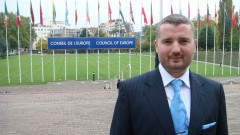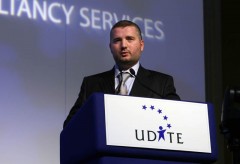29/06/2010
Jordan-Turkey-Europe: a model partnership?
22:19 | Permalink | Comments (0) | Tags: jordan, council of europe, coe, aqaba
14/03/2010
UMM to Play Role in Euro-Arab Dialogue
T.C. MARMARA BELEDİYELER BİRLİĞİ
UNION OF MUNICIPALITIES OF MARMARA
![]()
PRESS RELEASE
13.03.2010, Istanbul
UMM TO PLAY ROLE IN EURO-ARAB DIALOGUE
Murat Daoudov, the Director of EU and International Relations of the Union of Municipalities of Marmara (Turkey), has been nominated member of the high profile North-South Centre Think-Tank of the Council of Europe dedicated to the Euro-Mediterranean dialogue.
In the framework of the agreement signed between the Council of Europe and the London-based MBI Al Jaber Foundation with the objective of developing co-operation on Intercultural Dialogue in the Euro-Mediterranean region, a special think tank has been set up for four years under the coordination of the Centre for Global Interdependence and Solidarity of the Council of Europe (known as the “North-South Centre”). In line with the recommendations and policy guidelines outlined in the “White Paper on Intercultural Dialogue”, the partnership between the Council of Europe and the MBI Al Jaber Foundation focuses on strengthening Euro-Arab co-operation, and promoting education for human rights, rule of law, democratic citizenship and intercultural understanding. The agreement covers activities in the fields of research, support to in-service training and curriculum development, networking and discussion forums. 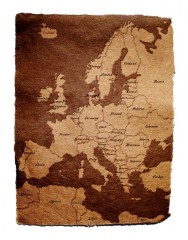
Speaking on the occasion of the signing the agreement, Council of Europe’s Secretary General Thorbjørn Jagland said: “Intercultural understanding is one of the main challenges of our societies: the Council of Europe has acted as a bridge in the last 60 years between different cultures in our Continent. Fostering dialogue is crucial for human rights’ protection and development. I welcome this agreement with the MBI Al Jaber Foundation. It will enhance co-operation in the Euro-Mediterranean region, building on the MBI’s extensive experience, know-how and contacts in the area.”
The official setting-up of the Think-Tank, composed of the representatives of the NSC “quadrilogue” (international organisations, governments, civil society and local authorities), will take place in Lisbon in May 2010, on the occasion of the 20th anniversary Ceremony of the North-South Centre and the Award of the North South Prize to M. Gorbatchev and R.Dashti.
Members of the Think-Tank
Chair of the Think-Tank: Mr. Eberhard KOELSCH, Vice-Chair of the North-South Centre Executive Council
Mr. Koelsch was Permanent Representative of Germany to the Council of Europe from 2006 until 2009. He is now a lecturer at Bonn University in Germany and a regular speaker at programmes of various political foundations and other institutions of adult education.
Mr Victor ANGELO, Special Representative for MINURCAT, United Nations Deputy Secretary General
Mr Angelo is currently the Special Representative for the United Nations Mission in Central African Republic and Chad (MINURCAT).
Ms Mbarka BOUAIDA, Member of Parliament, Chair of the Committee of Foreign Affairs, National Defence and Religious Affairs (Morocco)
Ms Bouaida is a member of the National Council of the National Rally for Independents (RNI), which forms a part of the current Moroccan governmental coalition. She is also a Member of the Economic Committee of the Parliamentary Assembly of the Mediterranean.
Mrs Alicia CABEZUDO, Professor
Alicia Cabezudo is a Professor and Peace/Human Rights Educator and Consultant. Until recently, she was the Director of Educating Cities Latin America.
Mr Murat DAOUDOV, Director of EU and International Relations at the Union of Municipalities of Marmara (Turkey)
Mr Daoudov works as Director of EU & International Relations at the Union of Municipalities of Marmara. He is also founding member of the Turkish Association of Local Government Managers - YÖNDER.
Mr. Mir Asghar HUSAIN, Adviser of Mohamed Bin Issa Al Jaber, Founder of the MBI Al Jaber Foundation
As a UNESCO international civil servant, Mr. Husain worked as an Education Planning Specialist in Africa, Asia, and some Arab countries. Later on he went on to become Director of Education Planning, Policies and Strategies at UNESCO, in Paris.
Mr Yohannes MEZGEBE, Vice-President of the Pan African Youth Union
Yohannes Mezgebe is founder of the Youth Corps, a non-profit organization working with and among young people from academic institutions and the wider community. He is also the Co-Founder of the African Youth Forum for Peace (AYFP).
Mrs Felisa TIBBITTS, Executive Director of HREA
Felisa Tibbitts is co-founder and director of the Human Rights Education Associates (HREA), an international non-governmental organisation. Mrs Tibbitts is also Adjunct Faculty at the United Nations University for Peace and the Harvard Graduate School of Education.
* * * * *
Press Contact:
Mustafa ÖZKUL (international media) +90.535.7833605 mustafa.ozkul@marmara.gov.tr
Fatih SANLAV (Turkish media) +90.532.7283341 fatihsanlav@marmara.gov.tr
Contact and information:
Murat DAOUDOV murat@marmara.gov.tr http://licencetothink.blogspirit.com
For Turkish text see http://www.marmara.gov.tr/newsdetail.aspx?newsId=866
*********************************************************************
MBB, Avrupa ile Arap Dünyası Arasında Köprü Kuracak
Avrupa Konseyi ile Arap Dünyası, Marmara Belediyeler Birliği (MBB) üzerinden ilişki kuracak. Marmara Belediyeler Birliği AB ve Uluslararası İlişkiler Direktörü Murat Daoudov, Avrupa Konseyi tarafından oluşturulan sekiz kişilik üst düzey Kuzey-Güney Tefekkür Grubu üyeliğine seçildi.
Avrupa Konseyi’nin Avrupa-Arap Dünyası diyalogu için oluşturduğu ve aralarında Birleşmiş Milletler özel temsilcisi, büyükelçi, parlamento komisyon başkanı, akademisyenler ve uluslararası sivil toplum örgüt yöneticilerinin bulunduğu üst düzey Tefekkür Grubu üyeliğine, Marmara Belediyeler Birliği AB ve Uluslararası İlişkiler Merkezi Direktörü Murat Daoudov atandı. Merkezi Strasbourg’da bulunan Avrupa Konseyi, önümüzdeki dönemde Akdeniz ve Ortadoğu havzası ile yakın işbirliği kurmak, Avrupa ve Arap Dünyası arasında diyalog geliştirmek ve kültürler arası diyalog anlayışı alanlarında yeni politikalar üretmek amacıyla, dört yıllık süre için bir beyin takımı oluşturdu.
Konuyla ilgili açıklama yapan Avrupa Konseyi Genel Sekreteri Thorbjorn Jagland, “Avrupa Konseyi, Avrupa kıtasında 60 yıl boyunca kültürler arası köprü vazifesini görmüştür. Şimdi ise, Avrupa-Akdeniz havzasında işbirliğini ve Ortadoğu Havzası ile diyalogu pekiştirecektir” dedi. Sekiz kişiden oluşan ve uluslararası kurumların, hükümetlerin, sivil toplumun ve yerel yönetimlerin temsilcileri, ilk toplantısını yapmak üzere, Mayıs ayında Lizbon’da düzenlenecek olan Avrupa Konseyi Kuzey-Güney İşbirliği Merkezi 20. Kuruluş Yıldönümü kutlamaları vesilesi ile bir araya gelecek.
Geniş bilgi için: http://www.marmara.gov.tr/newsdetail.aspx?newsId=866
22:18 Posted in Activité | Permalink | Comments (0) | Tags: coe, council of europe, euro-arab, euro-mediterranean
17/02/2010
Turkey and the EU: Norwegian or British model?
23:48 | Permalink | Comments (0)
29/01/2010
Council of Europe: time for Pan-European consolidation
13:53 Posted in Article | Permalink | Comments (0) | Tags: council of europe, pan-european, greater europe, pace, coe
29/10/2009
Eclairage méditerranéen sur la (més)entente franco-turque

LIBERATION Tribune 28/10/2009
Eclairage méditerranéen sur la (més)entente franco-turque
Par MURAT DAOUDOV director - EU Relations Centre / Union of Municipalities of Marmara
L’opposition française à l’adhésion de la Turquie à l’UE empoisonne les relations entre deux pays. Or, la Turquie a autant besoin du soutien français au Nord que la France de son alliance au Sud.
Lancée en 2007, l’idée de l’Union méditerranéenne visait, entre autres, à confiner la Turquie au Sud, provoquant l’opposition d’Ankara à cette voie détournée cherchant à la détourner de la voie de Bruxelles. Même si par la suite le projet est renommé «l’Union pour la Méditerranée» et des gages sont donnés à la Turquie, elle l’a rejoint sans enthousiasme. Le Sommet de Paris a jeté les fondements de cette structure à laquelle on n’épargne plus, depuis, les qualificatifs tels que «union mort-née», «château fantôme». Voyons pourquoi. Devant la complexité de la situation en Méditerranée, avec un conflit arabo-israélien, les droits de l’homme et la démocratie qui font défaut dans bon nombre de pays, les architectes de cette Union ont opté pour sa «dépolitisation». Une voie moins épineuse que celle d’un engagement audacieux pour la paix et un attachement à la «diplomatie des valeurs». Résultat, l’UPM évitera soigneusement de s’immiscer dans le conflit ou de chercher à propager une quelconque démocratisation, elle se limitera à s’investir sur des éléments techniques comme l’environnement.
Ce contenu anodin a frustré plus d’un esprit. La rive sud ne se presse pas de s’y engager sans que l’Europe ne «mouille sa chemise» pour la Palestine. Les voix au Nord critiquent aussi cette dépolitisation qui évacue tout espoir d’un processus tendant vers plus de démocratie. En évitant tout élément politique, le concert franco-européen a préféré une ligne diplomatiquement «bénigne». Mais, pouvaient-ils vraiment faire autrement ? Le choix de ce «désambitionnement» était probablement dicté non pas seulement, ou tellement, par l’absence de l’ardeur que par un calcul froid du manque de «poids» réel pour faire taire les canons et faire bouger la Méditerranée arabe pour un changement systémique. Sans dire que l’«intégration méditerranéenne» restera relative aux yeux de ces «Méditerranéens», séparés non seulement par une mer mais aussi par un mur de visa.
Ré-politiser l’UpM
Pourtant, la crise de Gaza a démontré, en mettant l’Union pour la Méditerranée en veilleuse, combien la coopération même dépolitisée est otage des problèmes politiques laissés en veille. Si rien n’y est fait, l’UPM risque de se solder, après un lancement en fanfare, par un échec retentissant. Le remède est de lui donner une substance doublement politique : engagement pour la «modération» des uns et la «modernisation» des autres. Facile à dire, certes, car comment réussir ce pari a priori contradictoire ? Comment assurer un contenu promettant le changement en Palestine, pour plaire aux capitales arabes, tout en évitant de déplaire par une perspective de changements chez elles ? Devant ce pari improbable, la Turquie apparait incontournable. C’est elle qui peut cémenter l’union de deux camps très différents : membre de toute la gamme institutionnelle occidentale et membre de l’Organisation de la conférence islamique (OCI), observateur à l’Union Africaine, pays euro-asiatique avec un bagage démocratique à la fois ancien (droit de vote accordé aux femmes avant la France) et nouveau (récentes réformes).
La pièce turque au puzzle méditerranéen
Le potentiel turc reste inexploré, occulté par les relations tendues entre Paris et Ankara. Dans l’intervalle, alors qu’elle se méfit de cette Union, la Turquie s’engage en Méditerranée. Elle crée un espace de partenariat avec ses conseils de coopération stratégique avec la Syrie et l’Iraq, elle apporte son soutien à la modernisation municipale en Jordanie, et, en abandonnant les visas, ouvre courageusement ses portes à ceux à qui l’Europe ne fait que verrouiller davantage les siennes. Au sein de l’OCI, elle s’emploie à créer une Commission des droits de l’homme «à l’onusienne» et est qualifiée de «source d’étincelles de démocratisation»… par les conservateurs saoudiens ! Elle prouve aussi sa capacité de s’engager dans la résolution des tensions, lorsqu’elle intervient pour Gaza, entre la Syrie et l’Israël, dans la crise présidentielle libanaise, dans les rapports syro-iraquiens et syro-saoudiens, pour ne mentionner que les avancées diplomatiques sur le flanc sud. Combien de conflits l’Europe a-t-elle pu résoudre dans les mêmes temps ?
Une complémentarité à exploiter
Le soutien français aux aspirations européennes de la Turquie est crucial, tout comme l’implication turque pour sortir l’UpM de son impasse. Sans les grands discours, la Turquie devient le «soft power» régional et son caractère Européen avec sa proximité orientale séduisent les Arabes qui veulent se moderniser sans que cela ne soit «injecté» par le Nord. N’est-elle pas déjà là en train de réaliser discrètement ce que l’Union pour la Méditerranée rêvait de faire ?
http://www.liberation.fr/tribune/0101599738-eclairage-mediterraneen-sur-la-mes-entente-franco-turque
(Türkçe tercüme için http://licencetothink.blogspirit.com/list/articles-yaz%C4%B1lar/1648237342.2.pdf ;
English translation at http://licencetothink.blogspirit.com/list/articles-yaz%C4%B1lar/1023597647.pdf )
21:54 Posted in Article | Permalink | Comments (0) | Tags: upm, ufm, union pour la méditerranée, union for mediterranean
04/10/2009
Kaçmış Bir Fırsatın Ardından
Avrupa Konseyi, tarihinin en önemli krizini yaşadıktan sonra nihayet genel sekreterini seçti. 29 Eylül’de Strasbourg’da yapılan oylamada tehlikeli viraj aşıldı, Norveç’in eski başbakanı Thobjorn Jagland, beş yıllığına Atlantik’ten Pasifik’e kadar uzanan kıtada 47 ülkeyi temsil eden bu kurumun direksiyonuna geçti.
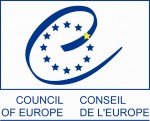
Filmi biraz geriye saralım. 2009’un Mart'ında biten adaylık sürecinde, “kurum içinden” ve “dışından” ikişer aday olmak üzere, Konseyin dört talibi çıkmıştı: Asamble üyesi milletvekillerinden, en büyük siyası grup olan merkez-sağın lideri Belçikalı Luc Van den Brande ve liberallerden Macar Matyas Eörsi’ye karşın, “ağır sıklet” isimler olan eski Polonya Başbakanı ve Dışişleri Bakanı Włodzimierz Cimoszewicz ile eski Norveç Başbakanı ve Dışişleri Bakanı Thorbjørn Jagland.
Gönülsüz yenen aş
Avrupa Birliği karşısında Konseyin ağırlığını artırmak isteyen Bakanlar Komitesi’nin ilk iki adayı, başbakanlık tecrübelerinin bulunmaması sebebiyle elemesi, krize yol açmış ve Asamble isyan etmişti. Zira, teamül gereği, genel sekreterler Asamble üyeleri arasından, siyasi grupların uzlaşması ile seçiliyordu. Üstelik, görevi dolan Davis gibi, Norveçli ve Polonyalı adaylar da sosyal-demokrat gelenekten geliyordu, oysa bu tür mevkilerde siyasi “dönüşüm” esastır. Sonuçta kimse seçilememiş, krizin çözülmesi ikinci tura, Eylül’de yapılan Asamble genel kuruluna kalmıştı.
Bu arada gelişmeler, aslında Norveçli adayın fiilen rakipsiz olduğunu gösterecekti. Zira, Temmuz ayında Avrupa Parlamentosu’nun başkanlığına Jerzy Buzek’in seçilmesi, Polonya’nın Avrupa’da bir başka üst düzey makam kapma şansını azaltmıştı. Zaten, son dönemde Konsey içinde büyüyen “Rusya krizi” de, Rusya karşıtı Polonya’nın bir adayının seçilmesi ihtimalini dolaylı olarak zayıflatıyordu. Tüm gözler Asambleye çevrilmişti. Asamble, Bakanlar Komitesi’nin ve şartların dayattığı “tek” adaya razı mı olacak, yoksa direnerek krizi devam mı ettirecek?
Fırsatın kazası olmaz
Çalkantılı süreçler aynı zamanda fırsatlarla doludur. Konseyi genel sekreterliğine Türkiye aday çıkarabilir miydi? Süreç, ideal bir adayın profilini nasıl çizmişti? Eski başbakan olacak, tercihen dışişleri tecrübesi bulunacak, İngilizceye hâkim, Fransızcayı ise öğrenmeye hazır ve tercihen sol gelenekten olmayan bir bayan. Zira, AKPA’nın Bakanlar Komitesi’ne yönelttiği eleştiriler arasında, bir bayan adayın bulunmaması ve aday “darlığı” konusu vardı.
Türkiye’nin önemli bir diplomatik başarısı olan, İslam Konferansı Örgütü’nün genel sekreterliğinin döneminin önümüzdeki yıllarda dolacağı düşünülürse, diplomatik rotanın Avrupa’nın köklü kurumlarına çevrilmesinde yarar var. Diplomasimiz ve Asamble’deki heyetimiz devreye girip, mevcut adaylar hususunda Konseyin iki organı arasında yaşanan ağır güven bunalımı nedeniyle, prosedürün yeniden başlatılmasını gündeme getirebilir miydi? Seçimin sıhhati adına birkaç ay daha beklenebilir, yeni toplantıya ek aday(lar)la girilirdi. Sanırım, Türkiye aday konusunda mutabakat sağlamak için gerekli müzakere kapasitesine de sahipti. Ayrıca, ülkenin âli çıkarları söz konusuyken, yok muydu Türkiye’de eski bayan başbakan, eski dışişleri bakanı, İngilizceye hakim, üstelik vatandaşlara AİHM’ye bireysel başvuru hakkının kendisi döneminde tanınmış olduğu eski bir merkez-sağ siyasetçisi?
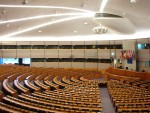
Yanlış hesap Strasbourg’dan döner
Hasbelkader “tek aday” Norveçli Jagland karşısında böyle bir girişimi bir an hayal edelim. Norveç-Türkiye final maçında, iki rakibi tahlil edelim. İkisi Konseyin kurucusu, ikisi AB üyesi değil, üstelik ilki AB’ye alınmak istenen fakat gelmeyen, ikincisi ise girmek isteyen ancak (henüz?) alınmayan ülke. AB’de olmadığı halde, birinin Schengen ile kapıları insanlara, diğerinin Gümrük Birliği ile mallara açık. Buraya kadar kriterlerin aşağı yukarı “eşitlendiği” bu durumda, kavganın temel sebebinin, Brüksel karşısında genel sekterliğe “süper lig” bir adayın gelmesinin istendiği göz önünde bulundurulursa, acaba 5 milyonluk Norveç’in mi, 72 milyonluk Türkiye’nin eski başbakan adayı mı “ağır” dururdu? Sonra, kadın-erkek fırsat eşitliğinin savunucusu, ancak geçmişte bir tek bayanın genel sekreter seçildiği Konsey için yapılan yarışta “cinsiyet üstünlüğü” faktörünü bir not edelim. Ayrıca, "üçüncü taraf" adayı ile, Asamble-Komite restleşmesinde kimsenin "boyun eğmediği", kazananın-kaybedenin olmadığı bir çözümü sunmanın avantajını da.
Şimdiye kadar üyesi bulunduğu BM, NATO, AGİT, OECD, Konsey gibi “Batı merkezli” kurumların hiç birinde genel sekreterlik üstlenmemiş olan Türkiye, Avrupalı dostlarıyla bu konuyu görüşebilir miydi? “Dost, ortak ve müttefik” Türkiye ile ilişkiler için “AB dışı” formülleri arayan Avrupa’nın bazı liderleri, bu ilişkilerin Avrupa Konseyi çatısı altında zaten imtiyazlı bir çerçevede bulunduğunu idrak edince gönülleri yumuşar mıydı? İnce hesaplar bazen büyük sonuçlar verir. Avrupa Konseyi’nin Haziran’daki “tezkere depreminde” 8 kişinin oyu teraziyi bir taraf çekmeye yetmişti. Sahi, heyetimiz kaç kişi, 12 asil mi?
Ancak, Konseyin ülkemizde gerçek anlamda anlaşıldığını söylemek oldukça güçtür. Ne ilginç, kurucusu sayıldığı bu kurumda boşalan genel sekreterlik Türkiye’de kalemleri harekete geçirmedi. Günümüzde yanlış hükümlerin artık kendisinden döndüğü, siyasilerin çıkmazlarda Venedik Kriterlerine sarıldığı kurum... Avrupalılığının tartışıldığı günlerde Türkiye’nin 60 yıldır “Avrupa tapusu” olan Konsey, bir UNESCO kadar heyecan uyandırmadı.
Uzatma yerine
“Ama seçileceği ne malumdu, rezil olmak da vardı” diyenleri duyar gibiyim. Haydi uzatma verelim, biraz daha hayal edelim. Pozisyonların bu kadar düğümlendiği bir yarışta, aba altından aday gücünü gösterdikten sonra onu geri çeken, yani BM’nin ilk genel sekreterliğini üstlenen bir ülkeye Avrupa Konseyi genel sekreterliğini "bahşeden" Türkiye’ye, serbest zamanlarında Nobel Komitesi başkanlığını yapan Vikinglerin torunu müteşekkir olur muydu? Bu minnettarlık duyguları ileride bir işimize yarar mıydı?
Yoksa ben rüya mı gördüm?
10:45 Posted in Article | Permalink | Comments (0)
New capital for new Council of Europe

New capital for new Council of Europe
by
MURAT DAOUDOV*
Established in 1949, with a dream to lay down the foundations of a “united Europe,” the Council of Europe lost this initiative to the Brussels-based EEC/EU.
__
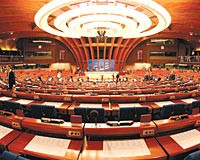
Nowadays the council -- of which most people are unaware, despite the fact that it represents “Greater Europe,” from the Atlantic to the Pacific -- must reinvent itself to meet the challenges of the 21st century. To do so, it should move its seat to İstanbul
The development of the European Union has for decades overshadowed the Council of Europe (CoE). Traditionally, it was considered that the council would focus on democracy, human rights and the rule of law, while the EU sought economic integration. However, with time Brussels also began to deal with human rights and democracy issues. This has lead to the questioning of Strasbourg's role and future. To justify itself, the latter notes that it covers 47 states in a vast continent stretching from Lisbon to Vladivostok. This in fact means that the CoE, which brings together Europe's EU and non-EU parts, finds its full meaning in the existence of its “non-EU” members. Otherwise, in the light -- or in the shadow -- of Brussels' Copenhagen political criteria, what is the reason to maintain an institution promoting the same values if it is not that it shares them with Turkey, Ukraine, Russia, Georgia, Armenia, Azerbaijan, etc.? And if so, there is not much sense in keeping the seat of the Council of Europe in Strasbourg.
In fact, the dynamics which led to the Strasbourg-based creation of the CoE and those of today differ considerably. With the fall of the Iron Curtain, the council's borders extended from the Berlin Wall to the Great Wall of China. Its new center of gravity needs to also move east, to the new meeting line between the two main areas of Europe it connects: İstanbul.
Symbol of unity or missed opportunity?
The Council of Europe emerged after World War II as a hope and promise of “the establishment of a European political authority, with limited functions but real powers” and the first concrete victory of movements for European unity. The choice of its seat perfectly reflected the hopes it cherished: the city of Strasbourg, the apple of discord between France and Germany, was meant to symbolize the end of enmity and the reconciliation between the peoples of Europe. However, euro-enthusiasts were soon disillusioned, as some states were not ready to see a supranational institution with partial transfer of sovereignty. With their opposition, cooperation remained at inter-governmental level and the Consultative Assembly of the CoE (today called the Parliamentary Assembly of the Council of Europe [PACE]) did not become the “parliament of Europe,” as once dreamed of, but remained a platform for national parliaments.
Later, in 1951, six countries established another mechanism of economic cooperation in Brussels: the European Coal and Steel Community (ECSC). Paradoxically, this economic initiative was the forerunner of a supranational political body of Europe. The European Economic Community, established in 1957 upon the foundations laid by the ECSC, realized the dream of Europe's founding fathers. In the end, not the CoE but the “common market” won the race for a united Europe.
The growing visibility of Brussels-based institutions and the fact that the EEC/EU encroached gradually on the fields of excellence of the CoE overshadowed the latter. Moreover, the adoption by the EU of symbols used by the CoE (the flag and anthem) add confusion as the institution is often taken for an EU body. Finally, as outlined by Le Soir in 1957, “the enterprise of six has eroded part of the political prestige of the Council of Europe.”
However, the council found its second life with the fall of the Iron Curtain and became the “ticket to Europe” for ex-communist countries. The end of the Cold War gave it the chance to embrace the whole European continent, as once dreamed of by Winston Churchill, who said: “Our objective is not limited to Western Europe… We must aim for not less than the union of the whole Europe.” Yet, the CoE was not the end goal for these new countries -- their real aspirations being to join the EU, seen as the final destination of their European future. So when many of them joined it in 2004-2007, inevitably the role of the CoE was again questioned. As a result, the prime minister of Luxembourg, Jean-Claude Juncker, was entrusted to draw a report on the future of relations between the CoE and the EU. In 2006, his report recalled that both were “products of the same idea, the same spirit and the same ambition.”
Four life cycles of the council
The council's development can be summarized in four phases:
1949-1957: A period of hopes and enthusiasm, when Strasbourg was seen as the center of a unified Europe [1].
1957-1989: A period of “unnoticed growth” in the shadow of the rising EEC. It became clear that the “European home” was being built in Brussels.
1989-2009: The dream of “Greater Europe” revived, but the main role of the CoE was to be the “antechamber of the EU” as it helped Eastern European countries transform before integration into the EU [2].
2009-present: A new period started as the CoE's “antechamber” role came to an end.
In this new phase, the CoE will have to reaffirm its identity. The EU, growing geographically “within” the council, has almost reached its boundaries and further extension is not foreseeable. This means the CoE will consolidate its capacity as the body representing “Greater Europe.” With the Western Balkans' EU integration, the enlargement will slow down, if not stop. Look at the EU's east: neither Russia nor Belarus have an “EU agenda.” The political instability of Ukraine makes it difficult to predict its EU perspective in the near future. The geographical “disconnectedness” and serious territorial disputes of Georgia, Armenia and Azerbaijan do not make them potential candidates. Political instability and territorial issues (with Transnistria) are Moldova's handicaps.
What about Turkey? Her case is specific. A member of the CoE since 1949, of NATO since 1952, it joined the “Western family” very early on. But despite its Association Agreement with the EEC since 1963, it has not been able to join the EU. Moreover, the opposition of the French and German political leadership makes its membership process a deal without a clear end.
Council of Europe anew
The CoE must free itself from being in the shadow of Brussels and consolidate itself as a pan-European player. To mark its new era, it should become part of the EU [3] and the Organization for Security and Cooperation in Europe (OSCE). Then it should also consider further enlargement into areas covered by two other European actors: Central Asia (through the OSCE) and the Mediterranean (through the Union for the Mediterranean). In this way, the “common democratic standards space” will broaden, simultaneously offering an important channel to the aspirations of those regions for rapprochement with Europe [4]. In the “multiculturalizing” world, the council must affirm its role as the platform where the concepts of democracy and good governance -- from the local to the international level -- are discussed on a wider scale.
Besides this, achieving greater visibility and engaging public opinion, the CoE must transfer its seat to the new meeting line of Europe. If the imperative 60 years ago was the reconciliation of France and Germany, today's challenge is to foster dialogue between two parts of the continent and between Europe and its neighboring regions and cultures. Such a move has already been suggested in the past when Mr. Curt Cristoph von Pfuel, rapporteur of its secretariat-general, suggested in 1957 that, in the event of the Iron Curtain's fall and the enlargement of the council to the east, its seat should move to a new center of gravity, probably to Vienna. In this respect, the choice of the seat of the OSCE in 1995 on the shores of the Danube -- rather than on those of the Rhine -- perfectly reflected the will to fix it according to the new reality.
Today, there is a city at Europe's new meeting line able to strengthen the symbolic value of the CoE: İstanbul. The city on the Bosporus presents many advantages. First of all, the center of Greater Europe should be open to all its countries. Nowadays, to go to Strasbourg -- the symbol of Europe's unity -- Europeans from 12 countries [5] need to obtain a Schengen visa, while citizens of all 46 countries can travel to İstanbul without prior visa formalities [6]. And they can do so easily: While only six international connections to European cities are offered to Strasbourg, 82 CoE cities are connected by air to İstanbul. After all, as Brussels is open to all EU citizens, shouldn't the “capital” of the CoE also have its doors open to all members?
Two other “border cities” capable of enriching the symbolic value of the council can be mentioned: Kiev and St. Petersburg. All three have the “capital” background in common. İstanbul served as the capital of the Roman, East Roman (Byzantine), Latin and Ottoman empires and was the center of both Orthodox Christendom and the Muslim caliphate. Kiev is the capital of a “border country” seeking its place between the West and the East. St. Petersburg, built by the Europe-oriented Peter the Great, is traditionally called “Russia's window to Europe.” However, the accessibility of İstanbul is a clear asset, as both Ukraine and Russia apply a visa regime to many CoE members [7].
The choice of İstanbul will symbolize the multicultural Europe of the 21st century. The year 2010, when the city will be a European Capital of Culture, seems to be a good moment to bring the matter to the table. This century offers a new mission for the CoE. If properly assumed, it will give it a high profile among European and international actors. The council will play the role of a “democratizing soft power” in Central Asia and in the Mediterranean, as it once played in Eastern Europe. Moreover, with 800 million -- or more -- citizens, it can become a sound voice on the world stage.
*Murat Daoudov is the director of EU and international relations at the Union of Municipalities of Marmara (İstanbul/Turkey).
[1] The establishment of the ECSC in 1951 will be the first sign of the upcoming weakening of this role.
[2] The CoE has already played a similar role in Greece, Spain and Portugal in the 1970s.
[3] The Juncker Report proposed that the EU, once it acquires its legal personality, adheres to the CoE by 2010.
[4] For example, Morocco applied for membership in the EEC in 1963, while Kazakhstan demanded observatory status with PACE in 1999.
[5] Expected to be nine by 2010.
[6] The citizens of several countries require a visa sticker, obtained for a small fee, upon arrival at the Turkish border.
[7] Seven CoE countries' citizens need a visa to enter Ukraine while 39 need one for Russia.
|
23 September 2009, Wednesday |
Note from MD: One aspect of the article has been, by mistake, inversely modified by the editors of the newspaper: The sentence "To mark its new era, it should become part of the EU [3] and the Organization for Security and Cooperation in Europe (OSCE)" initially was saying the inverse, i.e. "To mark its new era, it should involve as members the EU [3] and the Organization for Security and Cooperation in Europe (OSCE)". However this new content, introduced by inadvertence, could also be discussed.
09:55 Posted in Article | Permalink | Comments (0) | Tags: council of europe, istanbul





